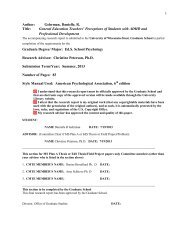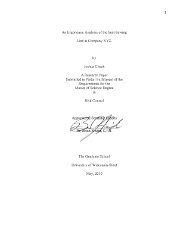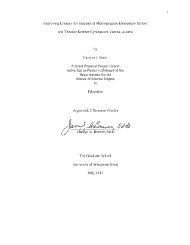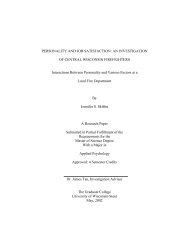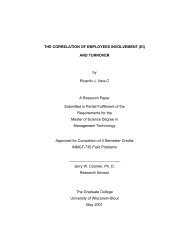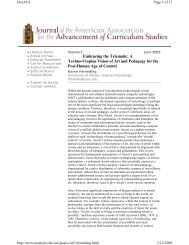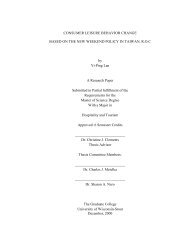A Review of the Literature on Three Types of Disenfranchised Grief ...
A Review of the Literature on Three Types of Disenfranchised Grief ...
A Review of the Literature on Three Types of Disenfranchised Grief ...
You also want an ePaper? Increase the reach of your titles
YUMPU automatically turns print PDFs into web optimized ePapers that Google loves.
that <str<strong>on</strong>g>the</str<strong>on</strong>g>y can focus <strong>on</strong> caring for and SUppOlting grieving family members (Fry, 1997; Galinsky,<br />
2001). As a result <str<strong>on</strong>g>of</str<strong>on</strong>g> <str<strong>on</strong>g>the</str<strong>on</strong>g>ir exclusi<strong>on</strong> and lack <str<strong>on</strong>g>of</str<strong>on</strong>g> acknowledgment, grandparents <str<strong>on</strong>g>of</str<strong>on</strong>g>ten experience<br />
a sense <str<strong>on</strong>g>of</str<strong>on</strong>g> isolati<strong>on</strong> or alienati<strong>on</strong> (Galinsky, 2001; Nehari, et ai., 2007).<br />
All <str<strong>on</strong>g>of</str<strong>on</strong>g> <str<strong>on</strong>g>the</str<strong>on</strong>g>se findings serve as evidence that grandparent grief is disenfranchised. Despite<br />
<str<strong>on</strong>g>the</str<strong>on</strong>g> fact that grandparents experience intense grief, <str<strong>on</strong>g>the</str<strong>on</strong>g>y are denied social recogniti<strong>on</strong> and<br />
acknowledgement. Grandparents are not <str<strong>on</strong>g>of</str<strong>on</strong>g>fered adequate social support and are instead<br />
expected to support o<str<strong>on</strong>g>the</str<strong>on</strong>g>rs; this deprives <str<strong>on</strong>g>the</str<strong>on</strong>g>m <str<strong>on</strong>g>of</str<strong>on</strong>g> <str<strong>on</strong>g>the</str<strong>on</strong>g> opportunity to process <str<strong>on</strong>g>the</str<strong>on</strong>g>ir emoti<strong>on</strong>s and<br />
focus <strong>on</strong> <str<strong>on</strong>g>the</str<strong>on</strong>g>ir own needs-"I blocked out <str<strong>on</strong>g>the</str<strong>on</strong>g> fact that he was dead. I did not want to upset my<br />
daughter by breaking down, and <str<strong>on</strong>g>the</str<strong>on</strong>g>y needed me to be str<strong>on</strong>g. I had no <strong>on</strong>e to hold me up." (De<br />
Frain et ai., 1991, p. 172).<br />
Doka (2002) defines five typologies <str<strong>on</strong>g>of</str<strong>on</strong>g> disenfranchised grief: relati<strong>on</strong>ship not recognized,<br />
loss not acknowledged, griever excluded, circumstances <str<strong>on</strong>g>of</str<strong>on</strong>g> death, and ways individuals grieve.<br />
Doka also notes that it is important to recognize that <str<strong>on</strong>g>the</str<strong>on</strong>g> five typologies <str<strong>on</strong>g>of</str<strong>on</strong>g> disenfranchised grief<br />
are not mutually exclusive. On a general level, grandparent grief is disenfranchised because <str<strong>on</strong>g>the</str<strong>on</strong>g><br />
significance <str<strong>on</strong>g>of</str<strong>on</strong>g><str<strong>on</strong>g>the</str<strong>on</strong>g> relati<strong>on</strong>ship is not recognized. However in certain situati<strong>on</strong>s, additi<strong>on</strong>al<br />
reas<strong>on</strong>s for disenfranchisement may be present and can fur<str<strong>on</strong>g>the</str<strong>on</strong>g>r complicate <str<strong>on</strong>g>the</str<strong>on</strong>g> grandparent's<br />
bereavement situati<strong>on</strong>. For example, <str<strong>on</strong>g>the</str<strong>on</strong>g> grandchild's death may not be recognized (e.g. a<br />
miscarriage), <str<strong>on</strong>g>the</str<strong>on</strong>g> grandparent may be mentally ill, developmentally disabled, or very old, <str<strong>on</strong>g>the</str<strong>on</strong>g><br />
death may be stigmatized (e.g. a suicide), or <str<strong>on</strong>g>the</str<strong>on</strong>g> grandparent may grieve in ways that are not<br />
socially recognized.<br />
The first time grandparent grief was addressed in <str<strong>on</strong>g>the</str<strong>on</strong>g> literature was by Gyulay in 1975<br />
when she noted that grandparents are "forgotten grievers" and that grandparent bereavement is a<br />
unique and l<strong>on</strong>ely experience. Although <str<strong>on</strong>g>the</str<strong>on</strong>g> term "disenfranchised grief' had not yet been<br />
19



